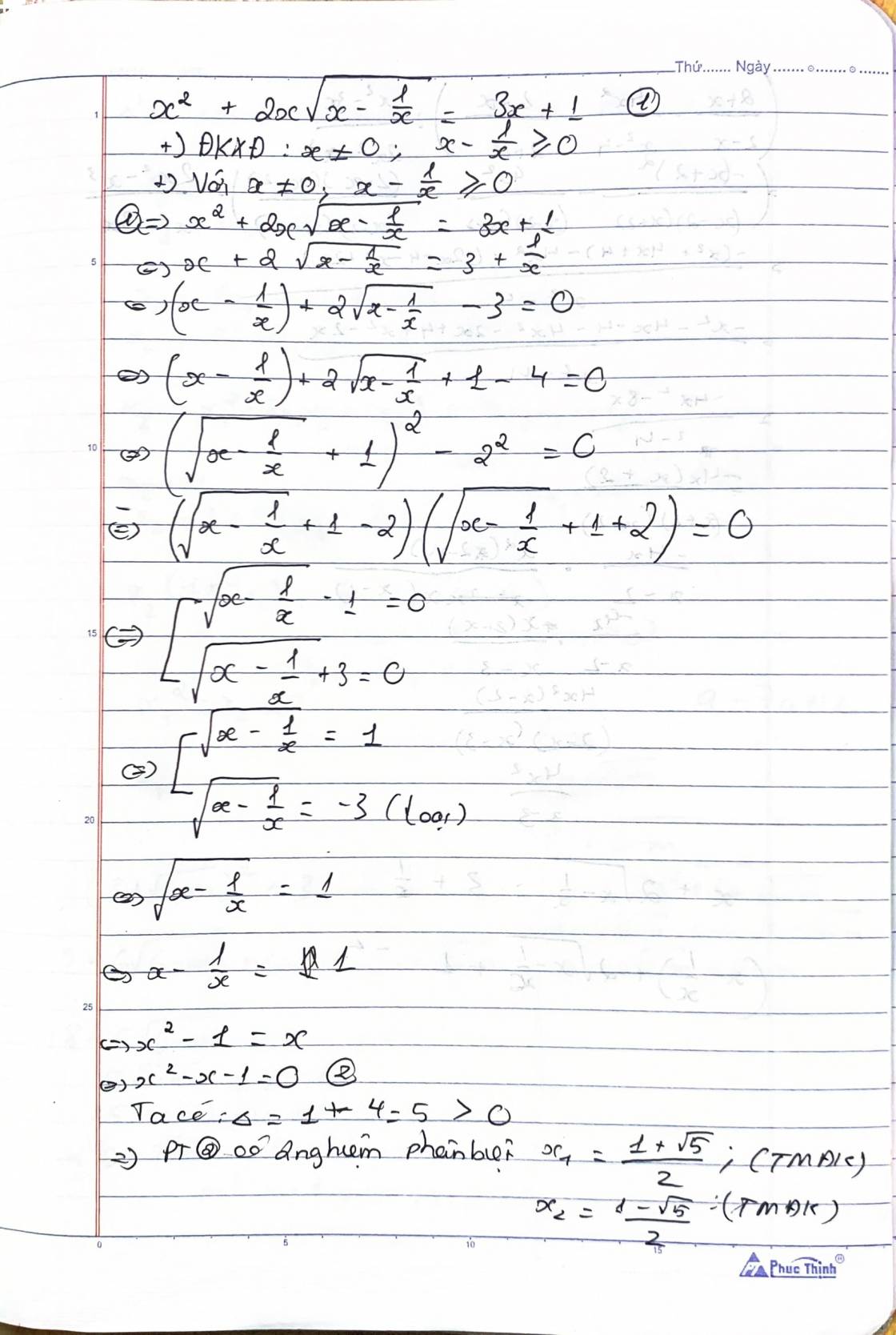

Hãy nhập câu hỏi của bạn vào đây, nếu là tài khoản VIP, bạn sẽ được ưu tiên trả lời.



a)\(\sqrt{3x+1}+2x=\sqrt{x-4}-5\left(ĐKXĐ:x\ge4\right)\)
\(\Leftrightarrow\left(\sqrt{3x+1}-\sqrt{x-4}\right)+\left(2x+5\right)=0\)
\(\Leftrightarrow\frac{3x+1-x+4}{\sqrt{3x+1}+\sqrt{x-4}}+\left(2x+5\right)=0\)
\(\Leftrightarrow\frac{2x+5}{\sqrt{3x+1}+\sqrt{x-4}}+\left(2x+5\right)=0\)
\(\Leftrightarrow\left(2x+5\right)\left(\frac{1}{\sqrt{3x+1}+\sqrt{x-4}}+1\right)=0\)
a') (tiếp)
\(\Leftrightarrow\orbr{\begin{cases}2x+5=0\\\frac{1}{\sqrt{3x+1}+\sqrt{x-4}}+1=0\end{cases}}\Leftrightarrow\orbr{\begin{cases}x=-2,5\left(KTMĐKXĐ\right)\\\frac{1}{\sqrt{3x+1}+\sqrt{x-4}}+1=0\end{cases}}\)
Xét phương trình \(\frac{1}{\sqrt{3x+1}+\sqrt{x-4}}+1=0\)(1)
Với mọi \(x\ge4\), ta có:
\(\sqrt{3x+1}>0\); \(\sqrt{x-4}\ge0\)
\(\Rightarrow\sqrt{3x+1}+\sqrt{x-4}>0\Rightarrow\frac{1}{\sqrt{3x+1}+\sqrt{x-4}}>0\)
\(\Rightarrow\frac{1}{\sqrt{3x+1}+\sqrt{x-4}}+1>0\)
Do đó phương trình (1) vô nghiệm.
Vậy phương trình đã cho vô nghiệm.

a,5x2-3x+1=2x+11
\(\Leftrightarrow5x^2-3x+1-2x-11=0\)
\(\Leftrightarrow5x^2-5x-10=0\)
có a-b+c=5+5-10=0
=>\(\left\{{}\begin{matrix}x_1=-1\\x_2=2\end{matrix}\right.\)
vậy PT đã cho có 2 nghiệm là x1=-1;x2=2
b/\(\dfrac{x^2}{5}-\dfrac{2x}{3}=\dfrac{x+5}{6}\)
=>6x2-20x-5x-25=0
<=>6x2-25x-25=0
<=>(x-5)(6x+5)=0
\(\Leftrightarrow\left\{{}\begin{matrix}x=5\\x=\dfrac{-5}{6}\end{matrix}\right.\)
vậy PT đã cho có 2 nghiệm x1=5; x2=\(\dfrac{-5}{6}\)
c.\(\dfrac{x}{x-2}=\dfrac{10-2x}{x^2-2x}\)
=>x2+2x-10=0
\(\Delta^'=1+10=11\)
vì \(\Delta^'>0\) nên PT có 2 nghiệm phân biệt
x1=-1-\(\sqrt{11}\)
x2=-1+\(\sqrt{11}\)
d, \(\dfrac{x+0,5}{3x+1}=\dfrac{7x+2}{9x^2-1}\) ĐK x\(\ne\pm\dfrac{1}{3}\)
=>2(x+0,5)(3x-1) =2(7x+2)
=>6x2-13x-5=0
\(\Delta=169+120=289\Rightarrow\sqrt{\Delta}=17\)
vì \(\Delta\)> 0 nên PT có 2 nghiệm phân biệt
x1=\(\dfrac{13-17}{6}=\dfrac{-1}{3}\) (loại)
x2=\(\dfrac{13+17}{6}=\dfrac{5}{2}\) (thỏa mãn)
e,\(2\sqrt{3}x^2+x+1=\sqrt{3}\left(x+1\right)\)
\(\Leftrightarrow2\sqrt{3}x^2-\left(\sqrt{3}-1\right)x+1-\sqrt{3}=0\)
\(\Delta=\left(\sqrt{3}-1\right)^2-8\sqrt{3}\left(1-\sqrt{3}\right)\)
=\(4-2\sqrt{3}-8\sqrt{3}+24\)
=25-2.5\(\sqrt{3}\)+3 =(5-\(\sqrt{3}\))2
vì \(\Delta\) >0 nên PT có 2 nghiệm phân biệt
x1=\(\dfrac{\sqrt{3}-1+5-\sqrt{3}}{4\sqrt{3}}=\dfrac{\sqrt{3}}{3}\)
x2=\(\dfrac{\sqrt{3}-1-5+\sqrt{3}}{4\sqrt{3}}=\dfrac{1-\sqrt{3}}{2}\)
f/ x2+2\(\sqrt{2}\)x+4=3(x+\(\sqrt{2}\))
\(\Leftrightarrow x^2+\left(2\sqrt{2}-3\right)x+4-3\sqrt{2}=0\)
\(\Delta=8-12\sqrt{2}+9-16+12\sqrt{2}=1\)
vì \(\Delta\)>0 nên PT đã cho có 2 nghiệm phân biệt
x1=\(\dfrac{3-2\sqrt{2}+1}{2}=2-\sqrt{2}\)
x2=\(\dfrac{3-2\sqrt{2}-1}{2}=1-\sqrt{2}\)
a.
\(5x^2-3x+1=2x+11\)\(\Leftrightarrow\)\(5x^2-5x-10=0\)\(\Leftrightarrow\)\(x^2-x-2=0\)\(\Leftrightarrow\)(x-2)(x+1)=0\(\Leftrightarrow\)\(\left[{}\begin{matrix}x-2=0\\x+1=0\end{matrix}\right.\)\(\Leftrightarrow\)\(\left[{}\begin{matrix}x=2\\x=-1\end{matrix}\right.\)
b.

pt(1)\(\Leftrightarrow\left(\sqrt{2x^2+x+1}-2x\right)+\left(\sqrt{x^2-x+1}-x\right)=0\left(đk;x\ge0\right)\)
\(\Leftrightarrow\frac{-2x^2+x+1}{\sqrt{2x^2+x+1}+2x}+\frac{-x+1}{\sqrt{x^2-x+1}+x}=0\)
\(\Leftrightarrow\frac{\left(2x+1\right)\left(x-1\right)}{\sqrt{2x^2+x+1}+2x}+\frac{x-1}{\sqrt{x^2-x+1}+x}=0\)
\(\Leftrightarrow x=1\)

Bài 1:
Đặt \(\hept{\begin{cases}S=x+y\\P=xy\end{cases}}\) hpt thành:
\(\hept{\begin{cases}S^2-P=3\\S+P=9\end{cases}}\)\(\Leftrightarrow\hept{\begin{cases}S^2-P=3\\S=9-P\end{cases}}\Leftrightarrow\left(9-P\right)^2-P=3\)
\(\Leftrightarrow\orbr{\begin{cases}P=6\Rightarrow S=3\\P=13\Rightarrow S=-4\end{cases}}\).Thay 2 trường hợp S và P vào ta tìm dc
\(\hept{\begin{cases}x=3\\y=0\end{cases}}\)và\(\hept{\begin{cases}x=0\\y=3\end{cases}}\)
Câu 3: ĐK: \(x\ge0\)
Ta thấy \(x-\sqrt{x-1}=0\Rightarrow x=\sqrt{x-1}\Rightarrow x^2-x+1=0\) (Vô lý), vì thế \(x-\sqrt{x-1}\ne0.\)
Khi đó \(pt\Leftrightarrow\frac{3\left[x^2-\left(x-1\right)\right]}{x+\sqrt{x-1}}=x+\sqrt{x-1}\Rightarrow3\left(x-\sqrt{x-1}\right)=x+\sqrt{x-1}\)
\(\Rightarrow2x-4\sqrt{x-1}=0\)
Đặt \(\sqrt{x-1}=t\Rightarrow x=t^2+1\Rightarrow2\left(t^2+1\right)-4t=0\Rightarrow t=1\Rightarrow x=2\left(tm\right)\)

a) \(\frac{1}{x-1+\sqrt{x^2-2x+3}}+\frac{1}{x-1-\sqrt{x^2-2x+3}}=1\)
ĐKXĐ : \(x\inℝ\)
\(\Leftrightarrow\frac{x-1-\sqrt{x^2-2x+3}}{\left(x-1+\sqrt{x^2-2x+3}\right)\left(x-1-\sqrt{x^2-2x+3}\right)}+\frac{x-1+\sqrt{x^2-2x+3}}{\left(x-1+\sqrt{x^2-2x+3}\right)\left(x-1-\sqrt{x^2-2x+3}\right)}=\frac{\left(x-1+\sqrt{x^2-2x+3}\right)\left(x-1-\sqrt{x^2-2x+3}\right)}{\left(x-1+\sqrt{x^2-2x+3}\right)\left(x-1-\sqrt{x^2-2x+3}\right)}\)
\(\Rightarrow2x-2=\left[\left(x-1\right)+\left(\sqrt{x^2-2x+3}\right)\right]\left[\left(x-1\right)-\left(\sqrt{x^2-2x+3}\right)\right]\)
\(\Leftrightarrow2x-2=\left(x-1\right)^2-\left(\sqrt{x^2-2x+3}\right)^2\)
\(\Leftrightarrow2x-2=x^2-2x+1-\left(x^2-2x+3\right)\)
\(\Leftrightarrow2x-2=x^2-2x+1-x^2+2x-3\)
\(\Leftrightarrow2x-2=-2\)
\(\Leftrightarrow2x=0\)
\(\Leftrightarrow x=0\)
Vậy phương trình có nghiệm duy nhất x = 0